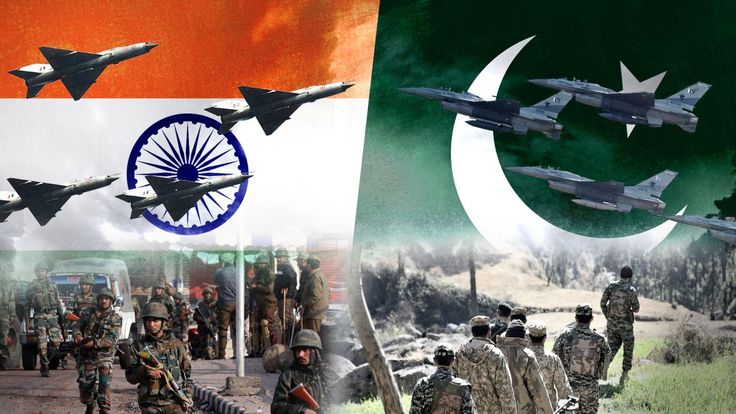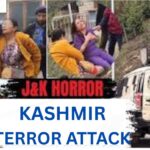That’s just the thing about great literature; it’s relevant even after nearly 5 centuries. Shakespeare’s quote “To be or not to be” aligned perfectly with the latest happenings of India and its neighbourhood. On 7th May 2025, India launched Operation Sindoor, to avenge the people who died in Pahalgam and get them justice. Some of us were hoping that our violent neighbour wouldn’t escalate it to the point where we would be worried about the India and Pakistan war taking place in the near future.
Operation Sindoor Post the Pahalgam Attack In Kashmir
Despite India’s clear stance and policies to eradicate terrorism, Pakistan has been harbouring terrorists to no end. It had been a breeding ground for radical terrorist groups. This has been acknowledged at different international platforms, then be it FATF, UNSC and more. India, while launching Operation Sindoor, did not attack any Pakistan military base, nor any civilian area. The targets were only the terror hubs located in Pakistan.
In total, 9 sites were targeted. The attack was based on the Intel of our intelligence agencies, who located the hubs belonging to the terrorist organisations such as ‘Lashkar-e-Taiba’, ‘Jaish-e-Mohammed’ and many more. The intent of the ‘Operation Sindoor’ was to establish restraint and ensure the fitting revenge for the Pahalgam terror attack.
However, our violent neighbour’s nasty intentions became pretty clear when their escalation targeted our innocents and civilians. The conflict between the two countries dramatically increased on the night of 7th May and continued well after that. The number of casualties increased on both sides, thus taking the form of India and Pakistan war, after decades of superficial peace between the two nations.
Innocents, children, and the elderly, who were supposed to live their lives, untouched by the scars that a war brings, now became the statistics under the list of ‘number of casualties’, which brings us to the centuries-old question: to war or not to war?
War as the Necessary Evil or Ultimate Destruction: India and Pakistan War
Remarque wrote ‘All quiet on the western front’, after the world war 1, in 1928 hoping that the world would not be facing another damning war but we disappointed him by fighting another just after 20 years and still continuing.
One doesn’t have to rely on the books to understand the bloodshed and loss of life that a war brings. When we see the landscape after a war, it looks like an image straight from hell.
Despite so much condemnation that we have regarding wars, we can’t deny their necessity. The hard fact to digest is that while war is a sword for some, it is a shield for others. Homi Bhabha said, “that war is the cost that we pay to maintain the peace”
India never wanted the escalation against Pakistan, however, our neighbour has let us down multiple times throughout history. The constant shelling, attacking our civilian areas, launching drones and missiles on innocents, are proof enough that they were looking for strong retaliation from India.
Operation Sindoor, as our armed forces made clear, was our answer to the state-sponsored terrorism that Pakistan continues to do despite multiple warnings from India and other nations. Our retaliation was never an escalation, but our attempt to eradicate terrorism from Pakistan. However, the escalation became inevitable when the shelling and attacks continued and killed civilians from the border areas, thus reaching the point of India and Pakistan war.
India’s policy of fighting a war has always been a last resort. Following the footsteps of Lord Krishna in the Bhagavad Gita, who never glorified war but stressed it as a last option or a moral duty when it’s in the defence of truth, justice and righteousness.
The De-Escalation Delusion in The India and Pakistan War
Every sane individual aiming for the development of their country loathes the idea of hate, war, violence, and bloodshed. However, the blame for escalating must be pinned on the nations that are sheltering terrorists and not the ones that retaliated for the protection of their innocents.
Even though the pseudo intellectuals from the west, propagandist countries like China and Turkey and some anti-national elements were trying to strong-arm India to de-escalate, India stood strong against all and any criticism.
Pakistan has been giving sanctuary to terrorists since its inception and has initiated every war that it has fought with India. Foreign media and the West have constantly asked for redundant proofs regarding Pakistan’s terror funding despite being the victim firsthand. Perhaps it is the blatant ignorance of Western pseudo-intellectuals that prevents them from recognising the unwavering support Pakistan’s military extends to terrorists. They even attended the mourning ceremonies of Abdul Rauf Azhar’s family whose brother Masood Azhar is the founder of ‘Jaish-E- Mohammad’. Foreign media, regarding the recent India and Pakistan war have presented distorted facts. They forced India to ‘de-escalate’ despite being aware of the reasoning behind Operation Sindoor and India’s non-tolerant stance on terrorism.
Stopping The War Spiral Through Ceasefire: India and Pakistan War
India’s peace policy since its independence has always been clear and focused, as it prefers dialogue over aggression. Multiple peacekeeping contributions, panchsheel principles, and India’s very popular NFU(not first use) nuclear doctrine were all symbolising our vision towards peace.
Peace, however, has never stopped us from retaliating if the violence has been perpetrated on our innocent civilians.
Many have criticised the sudden ceasefire decision in India and Pakistan war and the notorious unwanted tweets from the US president, which, if anything was just a poor attempt to remain in spotlight and to show his and his nation’s pseudo glory. The sarcastic language and the phrasing of “1000 year conflict” showed the blazen unawareness, which was unexpected from a person at such a high position.
While many have been unsatisfied with the ceasefire agreement, it was necessary and an important and strategic decision. It was an exercise of India’s sovereign decision-making power. The press conference held by our armed forces on 11th May 2025 was enough to show our capabilities. The way the proofs were presented, the aura they radiated and the confidence they exhibited were all held in high regard.
Through the ceasefire, India proved its vision of peace again. A country on the path to major developments in the coming decade, it must focus on improving its economy, increasing exports, multiplying its trade and attain the targets of reaching 5 trillion dollar economy. This would take a backseat if India resorts to wars provoked by Pakistan who is already doomed, given its nasty decisions and pathetic leadership.
The regular DGMO meetings between India and Pakistan related to the ceasefire are being held to bring the situation under control; however, knowing Pakistan’s volatile tendencies, nothing is confirmed as of yet.
Conclusion
Indian PM’s speech that was delivered on 12 May 2025 showed the world that ceasefire was a sovereign decision and not the one that was brokered by the US to show itself in a positive light. While countries like China and Turkey continue to blindly support Pakistan, despite India being the first to offer assistance during the latter’s earthquake two years ago, and the IMF’s decision to indirectly fund terrorism, India remains resolute in its commitment to achieving its goals and fostering development.
The answer to war or not to war is a philosophical one, if not difficult, but it must be separated from retaliation for justified reasons. India has prevailed in establishing peaceful relations with other nations, if only our neighbours could cooperate.
Unfortunately, we don’t get to choose our neighbours, no matter how much we wish we could.
Also read “In the Name of What?: Kashmir Terror Attack“


